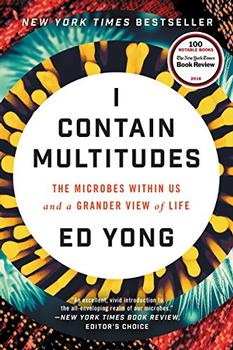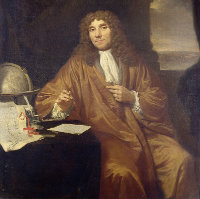Summary | Excerpt | Reviews | Beyond the Book | Read-Alikes | Genres & Themes | Author Bio

Critics' Opinion:
Readers' Opinion:
First Published:
Aug 2016, 368 pages
Paperback:
Jan 2018, 256 pages
 Book Reviewed by:
Book Reviewed by:
James Broderick
Buy This Book
This article relates to I Contain Multitudes
The discovery of microbes – those single-celled organisms that exist by the millions in a drop of water, blood, or tiny patch of any living tissue – was a game-changer, scientifically speaking. The once-preposterous notion of invisible creatures inhabiting our world opened the door to understanding how germs infect the body, how cells replicate, and how life itself begins. And who is the genius we have to thank for it? A civil servant from the Netherlands whose job was to make sure wine bottles being sold were sufficiently filled.
 Antoni van Leeuwenhoek, the wine-gauger of the town of Delft in the seventeenth century has come to be known in scientific circles as the "father of microbiology." This civil servant who lacked a university education and did not speak Latin, the lingua franca of scientists at the time, conducted his experiments using microscopes that he designed and built and even ground lenses for. Operating outside the mainstream of scientific experimentation – and cut off by distance and language from the great European scientific revolution – Leeuwenhoek nonetheless established himself as one of the most important pioneers of science in the modern age.
Antoni van Leeuwenhoek, the wine-gauger of the town of Delft in the seventeenth century has come to be known in scientific circles as the "father of microbiology." This civil servant who lacked a university education and did not speak Latin, the lingua franca of scientists at the time, conducted his experiments using microscopes that he designed and built and even ground lenses for. Operating outside the mainstream of scientific experimentation – and cut off by distance and language from the great European scientific revolution – Leeuwenhoek nonetheless established himself as one of the most important pioneers of science in the modern age.
"He documented everything. He repeated observations. He conducted methodical experiments. Even though he was an amateur, the scientific method ran deep within him – as did a scientist's untrammeled curiosity about the world," notes Ed Yong in I Contain Multitudes: The Microbes Within Us and a Grander View of Life. Leeuwenhoek occupies a prominent place in Yong's book, as much for his brilliance as his courage in putting forward theories that would have seemed bizarre, even crazy, in the seventeenth century. To affirm his sanity, this Dutch civil servant invited lots of people into his home laboratory ("a notary, a barrister, a physician, and other gentlemen of repute") and had them gaze at pond water, hair, blood, and insect parts through his homemade lenses to verify his observations.
As word spread of Leeuwenhoek's discoveries, so did his reputation. Soon, he was corresponding with members of the newly established Royal Society in London, and as he continued to improve his microscopes, he continued to document the presence of the living creatures he found swarming in everything from rain water to human saliva. Unaware of other scientists' excursions into the field, Leeuwenhoek charted his own path. As the Dictionary of Scientific Biography explains, the Dutchman's separateness from his scientific peers had its advantages: "[H]e was not always fully acquainted with the researches and theories of his fellow scientists...but he was thus able to work with full independence and to make a sharp distinction between the empiricism and speculation that marked the chaotic world of seventeenth-century science."
Though he freely shared the results of his microscope discoveries with others, Leeuwenhoek was stingy with information about how he made his microscopes. So closely guarded was the secret of his lens-making and mounting that it would take more than a century after his death before other scientists caught up to him – a nearly-tragic setback in the annals of science. As Yong says, "His attitude almost killed his legacy. When others looked through their inferior microscopes, they saw nothing, or imagined figments. Interest waned...a century and a half would pass between the discovery of the microbial world and its earnest exploration."
Picture of Antoni van Leeuwenhoek by Jan Verkolje
Filed under People, Eras & Events
![]() This "beyond the book article" relates to I Contain Multitudes. It originally ran in September 2016 and has been updated for the
January 2018 paperback edition.
Go to magazine.
This "beyond the book article" relates to I Contain Multitudes. It originally ran in September 2016 and has been updated for the
January 2018 paperback edition.
Go to magazine.





The House on Biscayne Bay
by Chanel Cleeton
As death stalks a gothic mansion in Miami, the lives of two women intertwine as the past and present collide.

The Flower Sisters
by Michelle Collins Anderson
From the new Fannie Flagg of the Ozarks, a richly-woven story of family, forgiveness, and reinvention.

The Funeral Cryer by Wenyan Lu
Debut novelist Wenyan Lu brings us this witty yet profound story about one woman's midlife reawakening in contemporary rural China.
Your guide toexceptional books
BookBrowse seeks out and recommends the best in contemporary fiction and nonfiction—books that not only engage and entertain but also deepen our understanding of ourselves and the world around us.